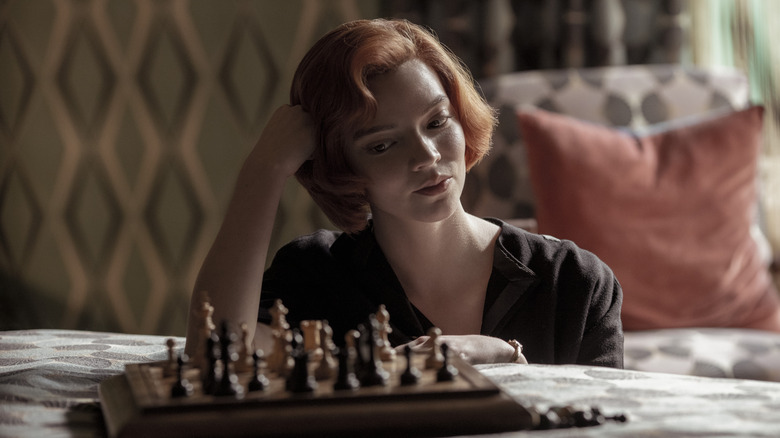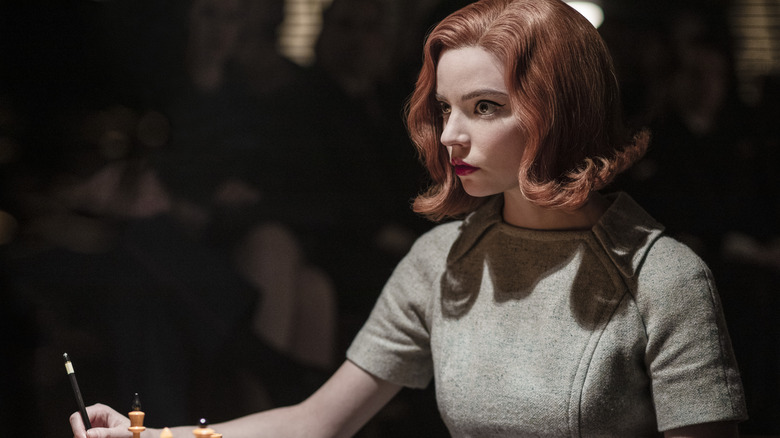Netflix Is Facing A Lawsuit From A Chess Pro Over The Queen's Gambit
Remember when "The Queen's Gambit" released on Netflix towards the end of 2020, just when it felt like we all needed some sort of shared pop culture experience to bring us all together again (even if only on the internet) in the midst of the pandemic? The Scott Frank ("Godless," "Logan," "Minority Report") miniseries about the self-destructive chess prodigy hit the spot, immediately shooting up to the top of Netflix's ratings, inspiring all sorts of hilarious memes, and further cementing Anya Taylor-Joy as one of our best young actors.
Unfortunately, not everyone came away from the show with the same sort of rapturous praise that many of us did. The series may have boasted an impressive amount of faithfulness to the actual strategies that many chess aficionados actually learn and use, but the accuracy of some of the historical figures depicted in certain episodes left their real-world counterparts ... a little miffed. As in, "Angry enough to file a lawsuit against Netflix" miffed. According to Variety, a federal judge ruled that the defamation lawsuit filed in September of 2021 by chess champion Nona Gaprindashvili from the Republic of Georgia would be allowed to stand, despite Netflix's attempts to have it dismissed under First Amendment rights to artistic license.
Gaprindashvili took particular issue with a line of dialogue in the series contending that, at least in the world of "The Queen's Gambit, she apparently "never faced men" during matches in the Soviet Union — exposition that was obviously meant to heighten the stakes for Taylor-Joy's Beth Harmon and further set her apart as a force to be reckoned with. The only problem is, well, that assertion isn't true whatsoever. Worse, that one line carried the potential to do significant harm to the real Nona Gaprindashvili's reputation, according to her lawyers. Though she never actually appears in-person on the series, a chess announcer following one of Beth Harmon's matches describes her in the following way: "Elizabeth Harmon's not at all an important player by their standards. The only unusual thing about her, really, is her sex. And even that's not unique in Russia. There's Nona Gaprindashvili, but she's the female world champion and has never faced men."
According to U.S. District Judge Virginia A. Phillips, enough ground exists for the lawsuit to proceed, setting up a fascinating battle over artistic license and freedom moving forward. Check out the details below!
Checkmate?
That sound you're hearing is likely the frenzied clacking away at keyboards from writers everywhere, jumping back into their scripts to do some serious rewriting in the wake of this latest court decision. If you thought that usual disclaimer about how "...the characters and events depicted in this program are fictitious. No depiction of actual persons or events is intended" would be enough to shield artists from potential lawsuits, as Netflix argued in court, think again. According to the Variety report, Judge Phillips has ruled that the lawsuit against Netflix and the portrayal of Nona Gaprindashvili in "The Queen's Gambit" can proceed. As he wrote in his decision,
"Netflix does not cite, and the Court is not aware, of any cases precluding defamation claims for the portrayal of real persons in otherwise fictional works. The fact that the Series was a fictional work does not insulate Netflix from liability for defamation if all the elements of defamation are otherwise present.
An average viewer easily could interpret the Line, as Plaintiff contends, as 'disparaging the accomplishments of Plaintiff' and 'carr[ying] the stigma that women bear a badge of inferiority' that fictional American woman Harmon, but not Plaintiff, could overcome. At the very least, the line is dismissive of the accomplishments central to Plaintiff's reputation."
By 1968, the year that "The Queen's Gambit" is set, the real Gaprindashvili had actually faced 59 total men in various matches (and likely won most, if not all, of them). Although an argument can be made that fictional dramatizations shouldn't have to rigidly stick to historical accuracy, the judge ruled that the real-world harm to Gaprindashvili's reputation as a result of that misleading line outweighed any other factor. The judge went on to note that, "In context, therefore, Netflix 'creat[ed] the impression that [it] was asserting objective facts.' Plaintiff sufficiently pleads falsity because the Line is 'reasonably susceptible of an interpretation which implies a provably false assertion of fact.'"
I would imagine that this case will likely end up with a quiet settlement between both parties rather than setting any major precedents, but it's probably enough to make creatives think twice about even throwaway lines that may misrepresent notable figures in history. We'll be keeping a close eye as this lawsuit progresses. In the meantime, you can brush up on your chess skills as "The Queen's Gambit" is available to stream on Netflix.

